Here are some samples of hats (caps) with a Cenocracy statement:

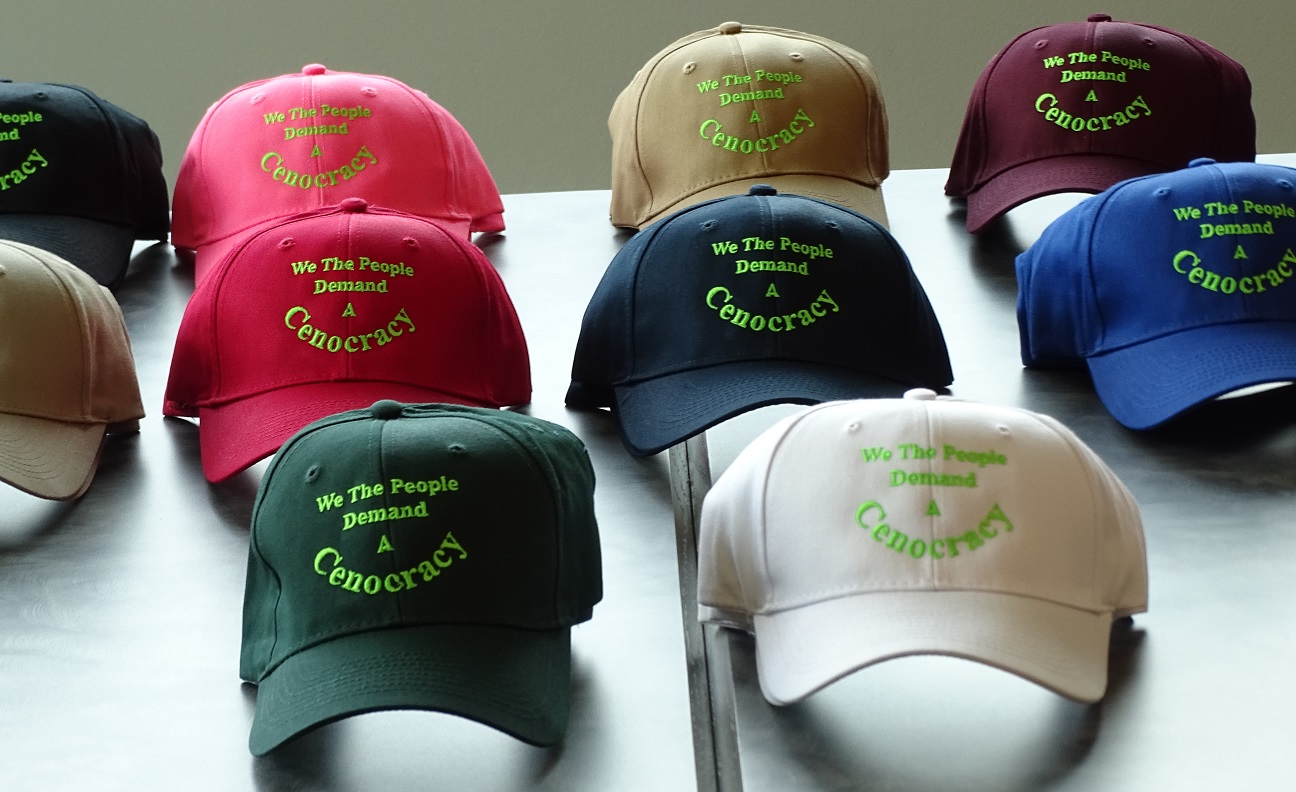
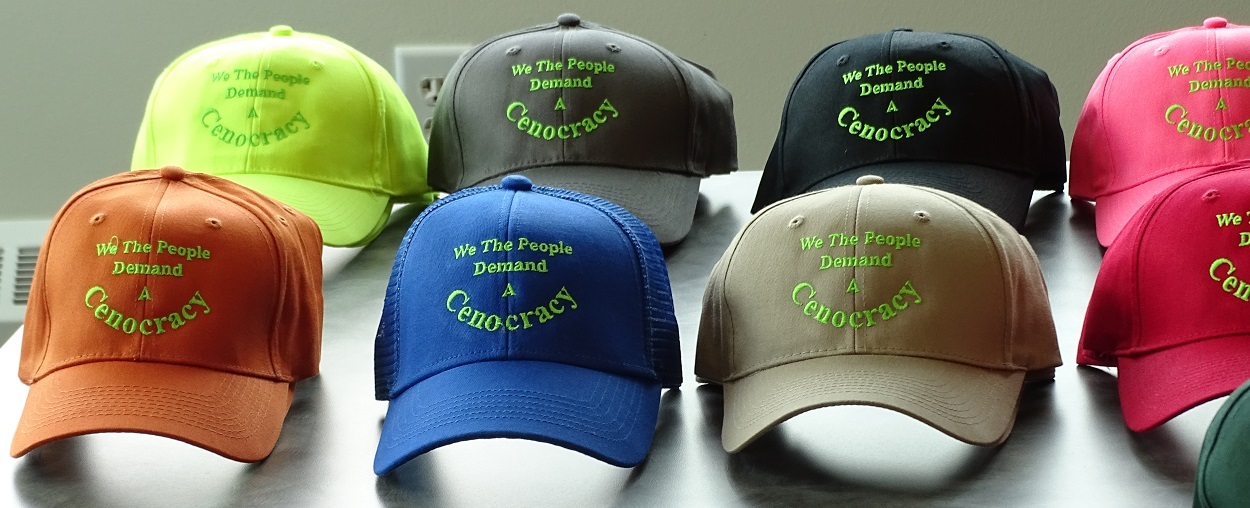
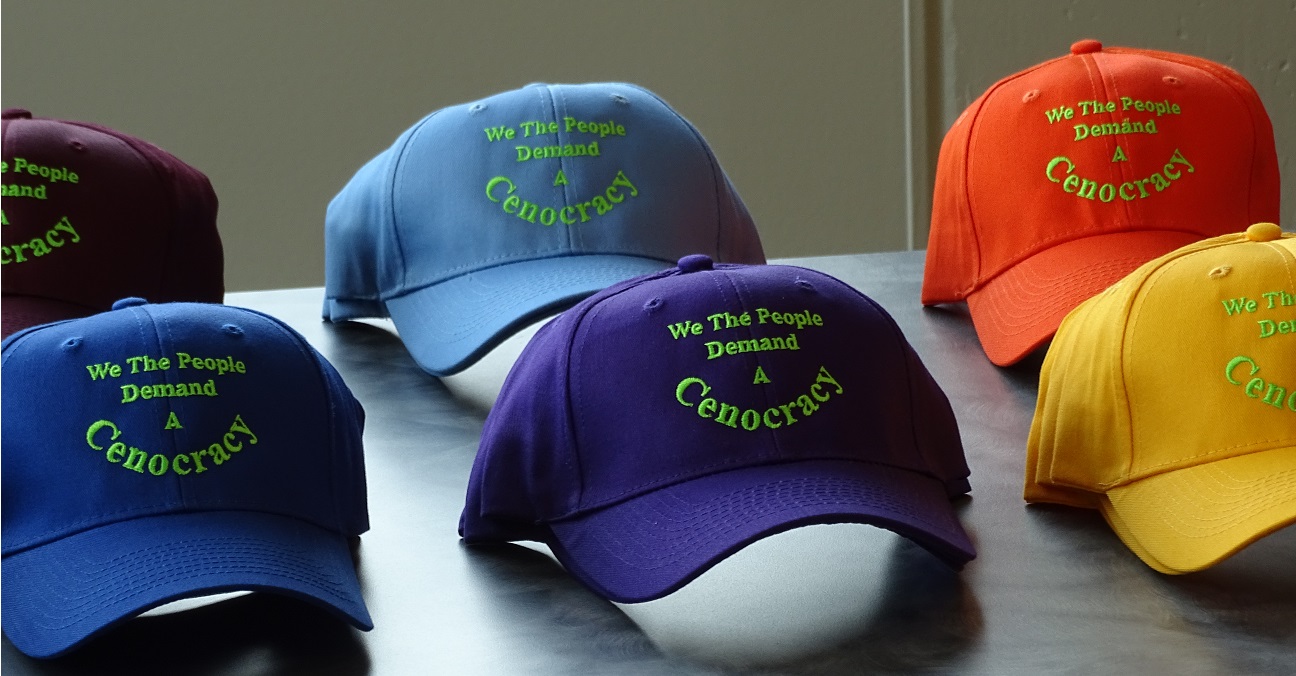
And while we're looking at hats, lets look at the political themes being used by Donald Trump (Republican), the Democrats, and an old button used by the Reagan-Bush duo... with a slight diversion to a political theme about Democracy itself:
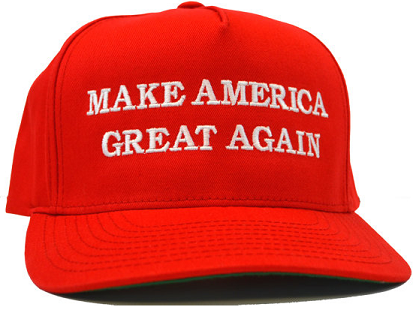 |
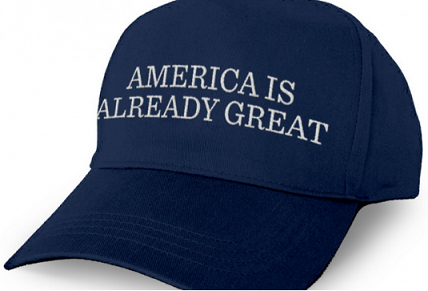 |
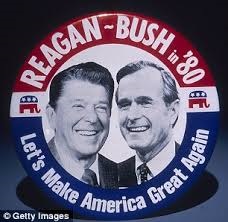 |
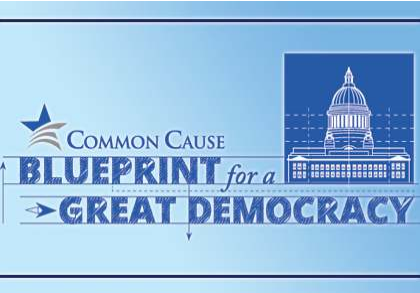 "Blueprint for a Great Democracy" (Slogan used by the Common Cause group) |
And though the word "Great" is not being used in the following hat samples, let us provide three that have been offered as being missing from the Republican line-up of slogans used by candidates. Additionally, one should note the style of the bill because it displays that being offered as the perspective of (the 21st century) millennials, whereas the curved bill is the more traditional style worn by those who use their caps for work-day practicality, more than just as a piece of clothing to denote a generational style without utility. Some might want to say the reason for this is because the older generations know what it is to work long hours in different weather conditions, while those sporting the flat bill prefer jobs in artificial (indoor) workplace environments where reality is determined by the pixels on a screen or how realistic a computer game is.
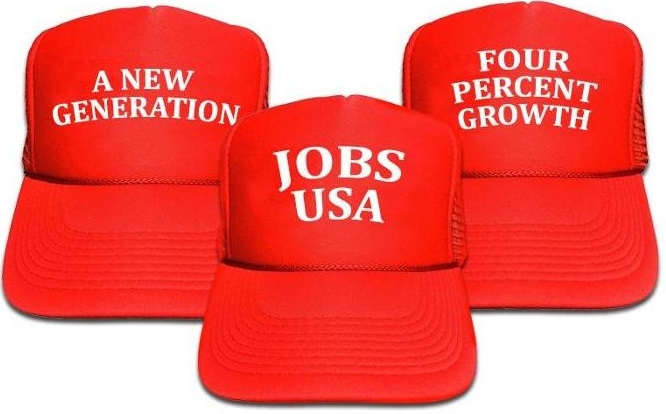
Above image from an article by Matt Bai on 2015-10-29... Missing from the Republican debate: Better hats
And now let us return to the topic of "great" by adding another image where the word "Great" has been attached as part of s slogan used by a character to sell a breakfast Cereal called Frosted Flakes:
 |
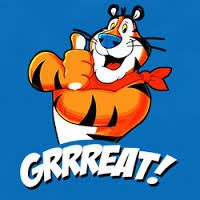 |
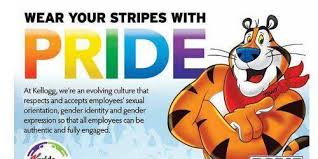 At Kellog we're an evolving culture that respects and accepts employees' sexual orientation, sexual identity and gender expression so that all employees can be authentic and fully engaged. |
The third image in the above selections sports the 'Tony the Tiger' character with a red handkerchief that, in former cowboy era days was sometimes seen as a common item used as a functional utility to keep dust out of one's face while riding a horse, or to wipe one's brow of sweat while toiling in the farms fields; but later came to signify a gang-related badge of identification. In addition to the gang symbolism, the worded caption addresses a prevailing cultural obsession with self-absorbed sexuality (though one might consider that a similar image touting an acceptance of a different form of "me-ism" in terms of "selfie" picture taking might also be contoured into the workplace). One must wonder whether such "me-ism" is a by-product of a teaching methodology used in public schools to make kids feel better about themselves by celebrating every action of mediocrity, sometimes with certificates given out during a school ceremony. Many teachers have adopted a verbal reinforcement teaching style like that used by those working with physically, mentally and/or emotionally challenged individuals.
And let us look at some more uses of the word "Great" in different contexts:
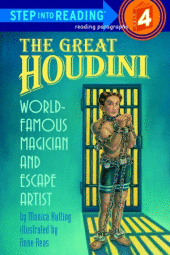 |
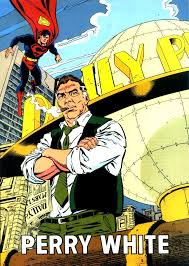 "Great Cesar's Ghost!" (Noted expression of Perry White) |
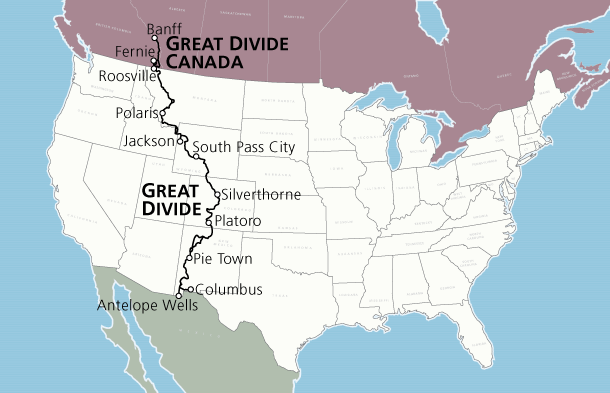 The Great (American) Divide Mountain Bike Route |
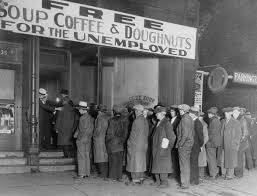 The Great (American) Depression |
There are of course other uses of the word "Great" such as by some circus performers, in the titles of movies (The Great Escape, The Great Gatsby, etc.,), and in offering another example of its usage to sell a commercial (food) product, let us add the one for Reese's peanut butter cups: "Two great tastes that taste great together." Let us also mention that there have been many rulers in history were recognized with the word "Great" in a culture's own language equivalent way. However in a modern setting, few people performing or wanting to perform a leadership position would dare use the word "Great" in reference to themselves. Instead, the word is used as a slogan with which to be identified with. Both the American Republicans and Democrats want to be associated with the word "Great" by an indirect association to themselves in slogans attached with the word "America", so as to conceal an attempt at a personal reference to themselves. It matters not that the word "Great" is being used as part of a slogan by a single person, whatever the political party the person is attached to can easily claim a reference thereto themselves. No less, some suspect that the word "God" can be interpreted to be a human identification with the words "Great, Greater, Greatest", through various formulas of geometric symbolism, cultural dress and customs... as well as the employed language in a given context. This link provides a list of "Great" persons in history: List of people known as "The Great".
The foregoing images aligned with the word "Great" is not an attempt to create a culture taboo against the word like many have done to such words as nigger, chink, whore, guk (gook), faggot (homosexual), and in some light-hearted contexts, words such as marriage, work, and the phrase 'take out the garbage'. No, there is no attempt being made of subjecting the word "Great" be included in some present or future "political correctness" list of dos and don'ts. The point for the excursion is to openly wonder what is being meant by the Phrases "Make America Great Again" and "America Is Already Great".
What in the world are such Democrats, Republicans, (and Independents) referring to? What part of "Greatness" are we to reflect on? Do we focus on the great gains of the military or the great loss of life? How about a great economy that subjects the people to occasional expressions of a great (deep) recession? Do we speak of the great divide of wealth between rich and poor, or the great limitation of democracy being practiced? Do we speak of the great works of social programs and charities, or the great levels of poverty and homelessness. Then again, how many people must suffer in one or another privation before it is defined with the word "Great"? Would the Depression of the early 20th century have been labeled "Great" if half the number of people were affected? Is there a specific standard (numerical or otherwise) by which the word "Great" is to be used, or is it an arbitrarily assigned denotation?
With respect to money, is the phrase "a lot of money" to be interpreted as great and the definition thereof is subjected to an excalation over time? For example, motion picture portrayals of large monetary amounts being won, stolen, inherited, lost, etc., have increased. Whereas a few hundred dollars was at one time displayed as being a lot of money, today's scripts involve the discussions of multi-millions, if not billions. One must wonder when the value of trillions is going to become common-place, or that something other than an ennumerated monetary value will become the standard that is equated with the notion of "great". Likewise, in a venue such as the military, will a "great" military force be equated with how many soldiers, tanks, guns, ships, bombers or atomic bombs, or will the number and/or type of biological weapons be used as the measuring tool? How about one person being in charge of a zillion atomic bombs laced with lethal viruses? Or how about the number of "special", "black", "dark", "secret", etc., opps (operations)? In short, how are we to actually describe the value of "great" if it is little more than a word like beauty, truth, justice, God or democracy?... in other words, in the eye of those in authority who are best able to force their biased Will on others and make it appear as the reasoned deduction reached by their followers?
If we say that a billion dollars is great wealth, are we to automatically assume that the holder of a billion dollars also possesses a similar "greatness" in perception and thinking? If not, then having millionaires and billionaires in government positions of authority does not mean we have the best leadership. In fact, if we are to say that getting elected costs enormous sums of money, yet the people are left with choosing between the lesser of two or more evils who spend a lot of money on their election campaigns, then we are in desperate need of a new currency which will enable us to have the best leadership. The monetary standard being used for commerce is wholly inadequate for assisting the public in getting a means by which the nation can improve. The money being used by commerce is a filthy form of bartering by which the people might progress. And those who react negatively to such a view are those who do not have the capacity to comprehend the usage of metaphor.
However, in knowing the foregoing, if I am a wealthy person wanting to minimize my wealth during an era when the public consciousness is focused on the notion of equalizing wealth distribution, do I and my journalistic friends shirk from using the word "Great" in any personal reference, with respect to income, holdings, or dealings that might otherwise be described in (great) monetary terms? If its usage can be that aligned with a notion of disparity, can its absence thus be used to keep a low profile of a financial-based ego? Whereas leaders or potential leaders have thought to impress the public masses by a declaration of great wealth, as if it represented some super-ordinary quality that should be deferred to, can or does its absence, regardless of form, denote a means of concealment, of camouflage? No doubt this can sometimes be accentuated by taking part in activities and wearing clothes that do not express wealth... so as to appear to be a person just like everybody else.
So what is being referred to when someone speaks of a Great America or a Great Democracy? When there are both positive and negative attributes which can be aligned with such a word, are we simply to play the part of being a hypocrite and dismiss the existence of Great disparities in education, medical treatment, equal rights, animal rights, legal representation, and even the usage of democracy itself? Whereas it is wonderful to recognize only the Good Greats because it inflates one's ego to a grand-standing level of self-respect, it is also a point of hypocrisy to deliberately keep the available appraisals of "negative greatness". For example, we might want to put law enforcement on display as an expression of greatness, but also is necessary to point out the "greatness" of a prison population that is increasing. On the other hand, we should not be so quick to accept a few instances as an expression to be equated with greatness, and therefore needs to be addressed as if there are not other issues of greater importance. For example, the media reports on, say twenty instances of faults committed by police that may or may not involve the death of a person; whereby there is a media-reported and defined "out-cry" from the public defining such occasions as abuse, corruption, murder, racism, etc., yet the thousands of instances in which police officers don't exhibit faults... is minimized by way of a negligibility. least of all any media-sponsored recognition thereof.
Someone could have the slogan "America the Great Hypocrisy" placed on hats, and be expressing an honesty; yet those who exercise the hypocrisy of dismissing the bad so as to embellish the good to exhibit a higher standard of personal interest, might find such an expression as an offense to their sensibility. A sensibility that has long been drugged by a lop-sided perspective because their emotional balance is easily destabilized. It is a situation in which William Shakespeare found himself because people would avoid him for fear of his "sharp" (truthful) tongue. It is little different for us supporting Cenocracy.org when we ask what is meant by the usage of the word "Great", noting that those using such are engaging in the expression with a generalized superficiality and are wholly unprepared to analyze the reference to the degree it needs to be. Whereas many readers fully appreciate the application of intended honesty in describing both the good and bad of America and Democracy; because such an exercise underlies the need for a deep structural redesign in the governing system... those who have found some niche' or self-identifying familiarity within the prevailing system, do not want to be confronted with a stark appraisal that causes them to force themselves into supporting a far-reaching architectural re-draft.
A Cenocracy with a stated formula which deepens the usage of Democracy through a method of increased equitability of shared self-governance, is in fact an architectural draft which outlines a new landscape to be applied to the current social jungle. To have a Great America and a Great Democracy means to have a greater, more equitable usage of both by everyone. Though some do not as yet realize what is being meant by the people being subjected to limitations of America and Democracy, some might well come to appreciate the idea by viewing such words as resources that are and have resources that are not enjoyed equally by all. But this is not only the case with America, but Britain, Canada, China and elsewhere. The peoples of the world have suffered far too long from a severe limitation of Democracy. We The People must demand that a perpetual Class Action Democracy be brought against all governments, even those calling themselves a Communism or Socialism. This is not an absence of Nationalism, but the application of a Globalism... the likes of which humanity has never before witnessed. A far (more honestly) greater Democracy can be achieved by way of a Cenocracy.
Date of Origination and initial posting: Tuesday, October 6, 2015
Updated Posting: Tuesday, November 24, 2015